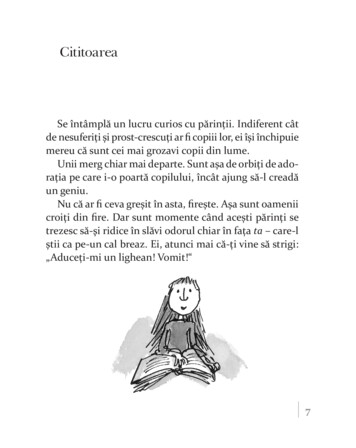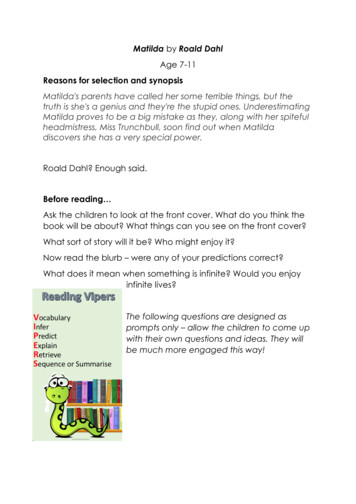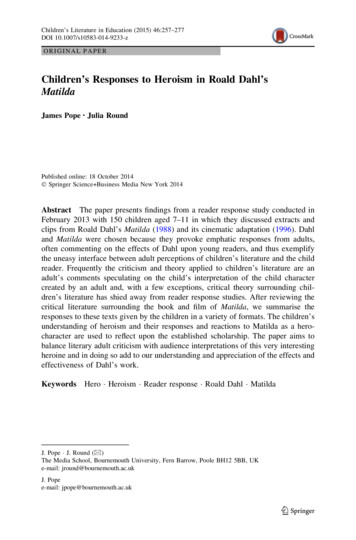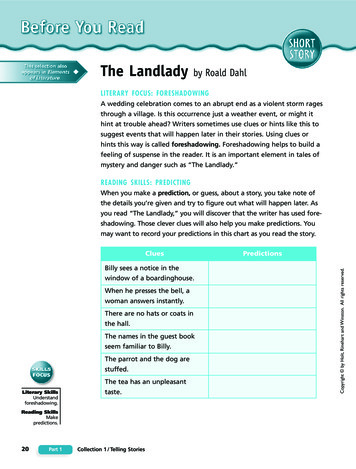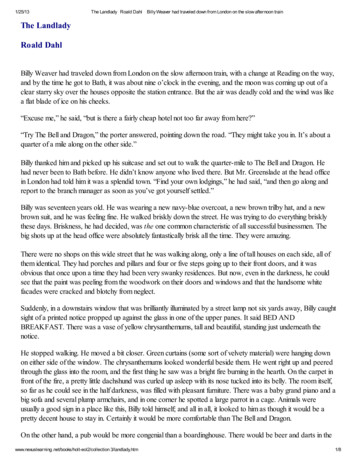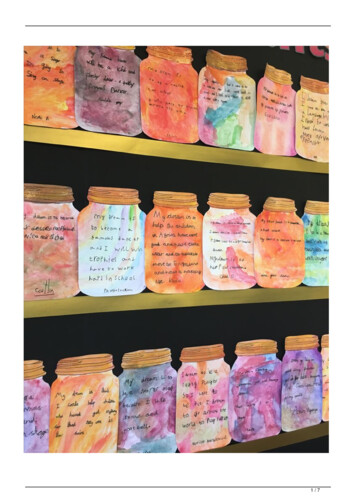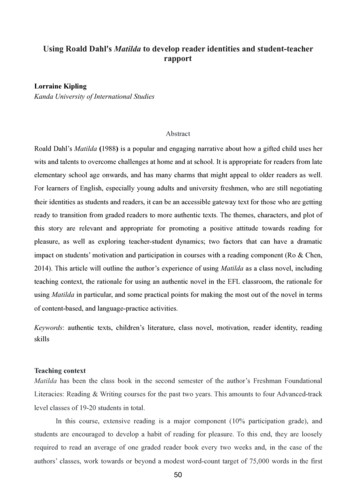
Transcription
Roald DahlTHE WITCHESCopyright Roald Dahl, 1983NOTICE :This is copyright material. This eBook was for mypersonal archive use only, as provided under the "fairuse" provision of the Copyright Law. If you somehowgot hold of this eBook file, by whatever means, and youdo not own a copy of the original book, please deletethis file immediately. I will not be held responsible foryour actions after you have been properly advised.-nihua1
A Note about WitchesIn fairy-tales, witches always wear silly black hats andblack cloaks, and they ride on broomsticks.But this is not a fairy-tale. This is about REALWITCHES.The most important thing you should know about REALWITCHES is this. Listen very carefully. Never forgetwhat is coming next.REAL WITCHES dress in ordinary clothes and lookvery much like ordinary women. They live in ordinaryhouses and they work in ORDINARY JOBS.That is why they are so hard to catch.A REAL WITCH hates children with a red-hot sizz-linghatred that is more sizzling and red-hot than any hatredyou could possibly imagine.A REAL WITCH spends all her time plotting to get ridof the children in her particular territory. Her passion isto do away with them, one by one. It is all she thinksabout the whole day long. Even if she is working as acashier in a supermarket or typing letters for abusinessman or driving round in a fancy car (and shecould be doing any of these things), her mind will2
always be plotting and scheming and churning andburning and whiz-zing and phizzing with murderousbloodthirsty thoughts."Which child," she says to herself all day long, "exactlywhich child shall I choose for my next squelching?"A REAL WITCH gets the same pleasure fromsquel-ching a child asyou get from eating a plateful ofstrawberries and thick cream.She reckons on doing away with one child a week.Anything less than that and she becomes grumpy.One child a week is fifty-two a year.Squish them and squiggle them and make themdisappear.That is the motto of all witches.Very carefully a victim is chosen. Then the witch stalksthe wretched child like a hunter stalking a little bird inthe forest. She treads softly. She moves quietly. Shegets closer and closer. Then at last, when everything isready.phwisst! . and she swoops! Sparks fly. Flamesleap. Oil boils. Rats howl. Skin shrivels. And the childdis-appears.A witch, you must understand, does not knock childrenon the head or stick knives into them or shoot at them3
with a pistol. People who do those things get caught bythe police.A witch never gets caught. Don't forget that she hasmagic in her fingers and devilry dancing in her blood.She can make stones jump about like frogs and shecan make tongues of flame go flickering across thesurface of the water.These magic powers are very frightening.Luckily, there are not a great number of REALWITCHES in the world today. But there are still quiteenough to make you nervous. In England, there areprobably about one hundred of them altogether. Somecountries have more, others have not quite so many.No country in the world is completely free fromWITCHES.A witch is always a woman.I do not wish to speak badly about women. Mostwomen are lovely. But the fact remains that allwitchesare women. There is no such thing as a malewitch.On the other hand, a ghoul is always a male. Soindeed is a barghest. Both are dangerous. Bu neither ofthem is half as dangerous as a REAL WITCH.As far as children are concerned, a REAL WITCH is4
easily the most dangerous of all the living crea-tures onearth. What makes her doubly dangerous is the factthat she doesn'tlook dangerous. Even when you knowall the secrets (you will hear about those in a minute),you can still never be quite sure whether it is a witchyou are gazing at or just a kind lady. If a tiger were ableto make himself look like a large dog with a waggy tail,you would probably go up and pat him on the head. Andthat would be the end of you. It is the same withwitches. They all look like nice ladies.Kindly examine the picture opposite. Which lady is thewitch? That is a difficult question, but it is one that everychild must try to answer.For all you know, a witch might be living next door toyou right now.Or she might be the woman with the bright eyes whosat opposite you on the bus this morning.She might be the lady with the dazzling smile whooffered you a sweet from a white paper bag in the streetbefore lunch.She might even--- and this will make you jump--- shemight even be your lovely school-teacher who isreading these words to you at this very moment. Lookcarefully at that teacher. Perhaps she is smiling at theabsurdity of such a sugges-tion. Don't let that put youoff. It could be part of her cleverness.5
I am not, of course, telling you for one second that yourteacher actually is a witch. All I am saying is thatshemight be one. It is most unlikely. But--- and herecomes the big "but"---it is not impossible.Oh, if only there were a way of telling for sure whethera woman was a witch or not, then we could round themall up and put them in the meat--grinder. Unhappily,there is no such way. But thereare a number of littlesignals you can look out for, little quirky habits that allwitches have in common, and if you know about these,if you remember them always, then you might justposs-ibly manage to escape from being squelchedbefore you are very much older.My GrandmotherI myself had two separate encounters with witchesbefore I was eight years old. From the first I escapedunharmed, but on the second occasion I was not solucky. Things happened to me that will probably makeyou scream when you read about them. That can't behelped. The truth must be told. The fact that I am stillhere and able to speak to you (however peculiar I may6
look) is due entirely to my wonderful grandmother.My grandmother was Norwegian. The Nor-wegiansknow all about witches, for Norway, with its blackforests and icy mountains, is where the first witchescame from. My father and my mother were alsoNorwegian, but because my father had a business inEngland, I had been born there and had lived there andhad started going to an English school. Twice a year, atChristmas and in the sum-mer, we went back to Norwayto visit my grand-mother. This old lady, as far as I couldgather, was just about the only surviving relative we hadon either side of our family. She was my mother'smother and I absolutely adored her. When she and Iwere together we spoke in either Norwegian or inEnglish. It didn't matter which. We were equally fluent inboth languages, and I have to admit that I felt closer toher than to my mother.Soon after my seventh birthday, my parents took me asusual to spend Christmas with my grandmother inNorway. And it was over there, while my father andmother and I were driving in icy weather just north ofOslo, that our car skidded off the road and wenttumbling down into a rocky ravine. My parents werekilled. I was firmly strap-ped into the back seat andreceived only a cut on the forehead.I won't go into the horrors of that terrible afternoon. Istill get the shivers when I think about it. I finished up, ofcourse, back in my grandmother's house with her arms7
around me tight and both of us crying the whole nightlong."What are we going to do now?" I asked her throughthe tears."You will stay here with me," she said, "and I will lookafter you.""Aren't I going back to England?""No," she said. "I could never do that. Heaven shalltake my soul, but Norway shall keep my bones."The very next day, in order that we might both try toforget our great sadness, my grandmother startedtelling me stories. She was a wonderful story-teller and Iwas enthralled by everything she told me. But I didn'tbecome really excited until she got on to the subject ofwitches. She was apparently a great expert on thesecreatures and she made it very clear to me that herwitch stories, unlike most of the others, were notimaginary tales. They were all true. They werethegospel truth. They were history. Everything she wastell-ing me about witches had actually happened and Ihad better believe it. What was worse, what was far, farworse, was that witches were still with us. They were allaround us and I had better believe that, too."Are youreally being truthful, Grandmamma?Reallyandtruly truthful?"8
"My darling," she said, "you won't last long in this worldif you don't know how to spot a witch when you seeone.""But you told me that witches look like ordin-arywomen, Grandmamma. So how can I spot them?""You must listen to me," my grandmother said. "Youmust remember everything I tell you. After that, all youcan do is cross your heart and pray to heaven and hopefor the best."We were in the big living-room of her house in Osloand I was ready for bed. The curtains were never drawnin that house, and through the win-dows I could seehuge snowflakes falling slowly on to an outside worldthat was as black as tar. My grandmother wastremendously old and wrinkled, with a massive widebody which was smothered in grey lace. She sat theremajestic in her armchair, filling every inch of it. Not evena mouse could have squeezed in to sit beside her. Imyself, just seven years old, was crouched on the floorat her feet, wearing pyjamas, dressing-gown andslippers."You swear you aren't pulling my leg?" I kept saying toher. "You swear you aren't just pretending?""Listen," she said, "I have known no less than fivechildren who have simply vanished off the face of this9
earth, never to be seen again. The witches took them.""I still think you're just trying to frighten me," I said."I am trying to make sure you don't go the same way,"she said. "I love you and I want you to stay with me.""Tell me about the children who disappeared," I said.My grandmother was the only grandmother I ever metwho smoked cigars. She lit one now, a long black cigarthat smelt of burning rubber. "The first child I knew whodisappeared", she said, "was called Ranghild Hansen.Ranghild was about eight at the time, and she wasplaying with her little sister on the lawn. Their mother,who was baking bread in the kitchen, came outside fora breath of air. 'Where's Ranghild?' she asked." 'She went away with the tall lady,' the little sister said." 'What tall lady?' the mother said." 'The tall lady in white gloves,' the little sister said. 'Shetook Ranghild by the hand and led her away.' No one",my grandmother said, "ever saw Ranghild again.""Didn't they search for her?" I asked."They searched for miles around. Everyone in the townhelped, but they never found her."10
"What happened to the other four children?" I asked."They vanished just as Ranghild did.""How, Grandmamma? How did they vanish?""In every case a strange lady was seen outside thehouse, just before it happened.""But how did they vanish?" I asked."The second one was very peculiar," my grand-mothersaid. "There was a family called Christian-sen. Theylived up on Holmenkollen, and they had an old oilpainting in the living room which they were very proudof. The painting showed some ducks in the yard outsidea farmhouse. There were no people in the painting, justa flock of ducks on a grassy farmyard and thefarmhouse in the back-ground. It was a large paintingand rather pretty. Well, one day their daughter Solvegcame home from school eating an apple. She said anice lady had given it to her on the street. The nextmorning little Solveg was not in her bed. The parentssearched everywhere but they couldn't find her. Then allof a sudden her father shouted, 'There she is! That'sSolveg feeding the ducks!' He was pointing at the oilpainting, and sure enough Solveg was in it. She wasstanding in the farmyard in the act of throwing bread tothe ducks out of a basket. The father rushed up to thepainting and touched her. But that didn't help. She wassimply a part of the painting, just a picture painted on11
the canvas.""Didyou ever see that painting, Grandmamma, with thelittle girl in it?""Many times," my grandmother said. "And the peculiarthing was that little Solveg kept changing her position inthe picture. One day she would actually be inside thefarmhouse and you could see her face looking out ofthe window. Another day she would be far over to theleft with a duck in her arms.""Did you see her moving in the picture,Grand-mamma?""Nobody did. Wherever she was, whether out-sidefeeding the ducks or inside looking out of the window,she was always motionless, just a figure painted in oils.It was all very odd," my grand-mother said. "Very oddindeed. And what was most odd of all was that as theyears went by, she kept growing older in the picture. Inten years, the small girl had become a young woman. Inthirty years, she was middle-aged. Then all at once,fifty-four years after it all happened, she disappearedfrom the picture altogether.""You mean she died?" I said."Who knows?" my grandmother said. "Some verymysterious things go on in the world of witches."12
"That's two you've told me about," I said."What happened to the third one?""The third one was little Birgit Svenson," mygrandmother said. "She lived just across the road fromus. One day she started growing feathers all over herbody. Within a month, she had turned into a large whitechicken. Her parents kept her for years in a pen in thegarden. She even laid eggs.""What colour eggs?" I said."Brown ones," my grandmother said. "Biggest eggs I'veever seen in my life. Her mother made omelettes out ofthem. Delicious they were."I gazed up at my grandmother who sat there like someancient queen on her throne. Her eyes were misty-greyand they seemed to be looking at something manymiles away. The cigar was the only real thing about herat that moment, and the smoke it made billowed roundher head in blue clouds."But the little girl who became a chicken didn'tdisappear?" I said."No, not Birgit. She lived on for many years laying herbrown eggs.""You said all of them disappeared."13
"I made a mistake," my grandmother said. "I am gettingold. I can't remember everything.""What happened to the fourth child?" I asked."The fourth was a boy called Harald, " mygrand-mother said. "One morning his skin went allgreyish-yellow. Then it became hard and crackly, likethe shell of a nut. By evening, the boy had turned tostone.""Stone?" I said. "You mean real stone?""Granite," she said. "I'll take you to see him if you like.They still keep him in the house. He stands in the hall, alittle stone statue. Visitors lean their umbrellas upagainst him."Although I was very young, I was not prepared tobelieve everything my grandmother told me. And yetshe spoke with such conviction, with such utterseriousness, and with never a smile on her face or atwinkle in her eye, that I found myself beginning towonder."Go on, Grandmamma," I said."You told me there were five altogether. Whathappened to the last one?"14
"Would you like a puff of my cigar?" she said."I'm only seven, Grandmamma.""I don't care what age you are," she said. "You'll nevercatch a cold if you smoke cigars.""What about number five, Grandmamma?""Number five", she said, chewing the end of her cigaras though it were a delicious asparagus, "was rather aninteresting case. A nine-year-old boy called Leif wassummer-holidaying with his family on the fjord, and thewhole family was picnicking and swimming off somerocks on one of those little islands. Young Leif divedinto the water and his father, who was watching him,noticed that he stayed under for an unusually long time.When he came to the surface at last, he wasn't Leif anymore.""What was he, Grandmamma?""He was a porpoise.""He wasn't! He couldn't have been!""He was a lovely young porpoise," she said. "And asfriendly as could be.""Grandmamma," I said.15
"Yes, my darling?""Did he really and truly turn into a porpoise?""Absolutely," she said. "I knew his mother well. Shetold me all about it. She told me how Leif the Porpoisestayed with them all that after-noon giving his brothersand sisters rides on his back. They had a wonderfultime. Then he waved a flipper at them and swam away,never to be seen again.""But Grandmamma," I said, "how did they know thatthe porpoise was actually Leif?""He talked to them," my grandmother said. "He laughedand joked with them all the time he was giving themrides.""But wasn't there a most tremendous fuss when thishappened?" I asked."Not much," my grandmother said. "You mustremember that here in Norway we are used to that sortof thing. There are witches everywhere. There'sprobably one living in our street this very moment. It'stime you went to bed.""A witch wouldn't come in through my window in thenight, would she?" I asked, quaking a little."No," my grandmother said. "A witch will never do silly16
things like climbing up drainpipes or breaking intopeople's houses. You'll be quite safe in your bed. Comealong. I'll tuck you in."How to Recognise a WitchThe next evening, after my grandmother had given memy bath, she took me once again into the living-roomfor another story."Tonight," the old woman said, "I am going to tell youhow to recognise a witch when you see one.""Can you always be sure?" I asked."No," she said, "you can't. And that's the trouble. Butyou can make a pretty good guess."She was dropping cigar ash all over her lap, and Ihoped she wasn't going to catch on fire before she'dtold me how to recognise a witch."In the first place," she said, "a REAL WITCH is certainalways to be wearing gloves when you meet her."17
"Surely notalways ," I said. "What about in the summerwhen it's hot?""Even in the summer," my grandmother said. "She hasto. Do you want to know why?""Why?" I said."Because she doesn't have finger-nails. Instead offingernails, she has thin curvy claws, like a cat, and shewears the gloves to hide them. Mind you, lots of veryrespectable women wear gloves, espe-cially in winter,so this doesn't help you very much.""Mamma used to wear gloves," I said."Not in the house," my grandmother said. "Witcheswear gloves even in the house. They only take them offwhen they go to bed.""How do you know all this, Grandmamma?""Don't interrupt," she said. "Just take it all in. Thesecond thing to remember is that a REAL WITCH isalways bald.""Bald?" Isaid."Bald as a boiled egg," my grandmother said.I was shocked. There was something indecent about a18
bald woman. "Why are they bald, Grand-mamma?""Don't ask me why," she snapped. "But you can take itfrom me that not a single hair grows on a witch's head.""How horrid!""Disgusting," my grandmother said."If she's bald, she'll be easy to spot," I said."Not at all," my grandmother said. "A REAL WITCHalways wears a wig to hide her baldness. She wears afirst-class wig. And it is almost impossible to tell a reallyfirst-class wig from ordinary hair unless you give it a pullto see if it comes off.""Then that's what I'll have to do," I said."Don't be foolish," my grandmother said. "You can't goround pulling at the hair of every lady you meet, even ifsheis wearing gloves. just you try it and see whathappens.""So that doesn't help much either," I said."None of these things is any good on its own," mygrandmother said. "It's only when you put them alltogether that they begin to make a little sense. Mindyou," my grandmother went on, "these wigs do cause arather serious problem for witches."19
"What problem, Grandmamma?""They make the scalp itch most terribly," she said. "Yousee, when an actress wears a wig, or if you or I were towear a wig, we would be putting it on over our own hair,but a witch has to put it straight on to her naked scalp.And the underneath of a wig is always very rough andscratchy. It sets up a frightful itch on the bald skin. Itcauses nasty sores on the head. Wig-rash, the witchescall it. And it doesn't half itch.""What other things must I look for to recognise awitch?" I asked."Look for the nose-holes," my grandmother said."Witches have slightly larger nose-holes than ordinarypeople. The rim of each nose-hole is pink and curvy,like the rim of a certain kind of sea-shell.""Why do they have such big nose-holes?" I asked."For smelling with," my grandmother said. "A REALWITCH has the most amazing powers of smell. She canactually smell out a child who is standing on the otherside of the street on a pitch-black night.""She couldn't smell me," I said. "I've just had a bath.""Oh yes she could," my grandmother said. "Thecleaner you happen to be, the more smelly you are to a20
witch.""That can't be true," I said."An absolutely clean child gives off the most ghastlystench to a witch," my grand-mother said. "The dirtieryou are, the less you smell.""But that doesn't make sense, Grandmamma.""Oh yes it does," my grandmother said. "It isn't thedirtthat the witch is smelling. It isyou . The smell that drivesa witch mad actually comes right out of your own skin. Itcomes oozing out of your skin in waves, and thesewaves, stink-waves the witches call them, go floatingthrough the air and hit the witch right smack in hernostrils. They send her reeling.""Now wait a minute, Grandmamma.""Don't interrupt," she said. "The point is this. When youhaven't washed for a week and your skin is all coveredover with dirt, then quite obviously the stink-wavescannot come oozing out nearly so strongly.""I shall never have a bath again," I said."Just don't have one too often," my grand-mother said."Once a month is quite enough for a sensible child."It was at moments like these that I loved my21
grandmother more than ever."Grandmamma," I said, "if it's a dark night, how can awitch smell the difference between a child and a grownup?""Because grown-ups don't give out stink--waves," shesaid. "Only children do that.""But I don'treally give out stink-waves, do I?" I said. "I'mnot giving them out at this very moment, am I?""Not to me you aren't," my grandmother said. "To meyou are smelling like raspberries and cream. But to awitch you would be smelling abso-lutely disgusting.""What would I be smelling of?" I asked."Dogs' droppings," my grandmother said.I reeled. I was stunned. "Dogs' droppings!"I cried. "Iamnot smelling of dogs' droppings! I don't believe it!Iwon't believe it!""What's more," my grandmother said, speaking with atouch of relish, "to a witch you'd be smelling offreshdogs' droppings.""That simply is not true!" I cried. "I know I am notsmelling of dogs' droppings, stale or fresh!"22
"There's no point in arguing about it," my grandmothersaid. "It's a fact of life."I was outraged. I simply couldn't bring myself to believewhat my grandmother was telling me."So if you see a woman holding her nose as shepasses you in the street," she went on, "that womancould easily be a witch."I decided to change the subject. "Tell me what else tolook for in a witch," I said."The eyes," my grandmother said. "Look care-fully atthe eyes, because the eyes of a REAL WITCH aredifferent from yours and mine. Look in the middle ofeach eye where there is normally a little black dot. Ifshe is a witch, the black dot will keep changing colour,and you will see fire and you will see ice dancing right inthe very centre of the coloured dot. It will send shiversrunning all over your skin."My grandmother leant back in her chair and suckedaway contentedly at her foul black cigar. I squatted onthe floor, staring up at her, fascinated. She was notsmiling. She looked deadly serious."Are there other things?" I asked her."Of course there are other things," my grand-mothersaid. "You don't seem to understand that witches are23
not actually women at all. Theylook like women. Theytalk like women. And they are able to act like women.But in actual fact, they are totally different animals.They are demons in human shape. That is why theyhave claws and bald heads and queer noses andpeculiar eyes, all of which they have to conceal as bestthey can from the rest of the world.""What else is different about them, Grand-mamma?""The feet," she said. "Witches never have toes.""No toes!" I cried. "Then what do they have?""They just have feet," my grandmother said. "The feethave square ends with no toes on them at all.""Does that make it difficult to walk?" I asked."Not at all," my grandmother said. "But it does givethem a problem with their shoes. All ladies like to wearsmall rather pointed shoes, but a witch, whose feet arevery wide and square at the ends, has the most awfuljob squeezing her feet into those neat little pointedshoes.""Why doesn't she wear wide comfy shoes with squareends?" I asked."She dare not," my grandmother said. "Just as shehides her baldness with a wig, she must also hide her24
ugly witch's feet by squeezing them into pretty shoes.""Isn't that terribly uncomfortable?" I said."Extremely uncomfortable," my grandmother said. "Butshe has to put up with it.""If she's wearing ordinary shoes, it won't help me torecognise her, will it, Grandmamma?""I'm afraid it won't," my grandmother said. "You mightpossibly see her limping very slightly, but only if youwere watching closely.""Are those the only differences then, Grand-mamma?""There's one more," my grandmother said. "Just onemore.""What is it, Grandmamma?""Their spit is blue.""Blue!" I cried. "Not blue! Their spit can't beblue !""Blue as a bilberry," she said."You don't mean it, Grandmamma! Nobody can haveblue spit!""Witches can," she said.25
"Is it like ink?" I asked."Exactly," she said. "They even use it to write with.They use those old-fashioned pens that have nibs andthey simply lick the nib.""Can younotice the blue spit, Grandmamma? If a witchwas talking to me, would I be able to notice it?""Only if you looked carefully," my grandmother said."If you looked very carefully you would probably see aslight blueish tinge on her teeth. But it doesn't showmuch.""It would if she spat," I said."Witches never spit," my grandmother said. "Theydaren't."I couldn't believe my grandmother would be lying tome. She went to church every morning of the week andshe said grace before every meal, and somebody whodid that would never tell lies. I was beginning to believeevery word she spoke."So there you are," my grandmother said. "That's aboutall I can tell you. None of it is very helpful. You can stillnever be absolutely sure whether a woman is a witch ornot just by looking at her. But if she is wearing the26
gloves, if she has the large nose-holes, the queer eyesand the hair that looks as though it might be a wig, andif she has a blueish tinge on her teeth--- if she has all ofthese things, then you run like mad.""Grandmamma," I said, "when you were a little girl,didyou ever meet a witch?""Once," my grandmother said. "Only once.""What happened?""I'm not going to tell you," she said. "It would frightenyou out of your skin and give you bad dreams.""Please tell me," I begged."No," she said. "Certain things are too horrible to talkabout.""Does it have something to do with your miss-ingthumb?" I asked.Suddenly, her old wrinkled lips shut tight as a pair oftongs and the hand that held the cigar (which had nothumb on it.) began to quiver very slightly.I waited. She didn't look at me. She didn't speak. All ofa sudden she had shut herself off com-pletely. Theconversation was finished.27
"Goodnight, Grandmamma," I said, rising from the floorand kissing her on the cheek.She didn't move. I crept out of the room and went to mybedroom.The Grand High WitchThe next day, a man in a black suit arrived at thehouse carrying a brief-case, and he held a longcon-versation with my grandmother in the living-room. Iwas not allowed in while he was there, but when at lasthe went away, my grandmother came in to me, walkingvery slowly and looking very sad."That man was reading me your father's will," she said."What is a will?" I asked her."It is something you write before you die," she said."And in it you say who is going to have your money andyour property. But most important of all, it says who isgoing to look after your child if both the mother andfather are dead."28
A fearful panic took hold of me. "It did say you,Grandmamma?" I cried. "I don't have to go tosomebody else, do I?""No," she said. "Your father would never have donethat. He has asked me to take care of you for as long asI live, but he has also asked that I take you back to yourown house in England. He wants us to stay there.""But why?" I said. "Why can't we stay here in Norway?You would hate to live anywhere else! You told me youwould!""I know," she said. "But there are a lot of com-plicationswith money and with the house that you wouldn'tunderstand. Also, it said in the will that although all yourfamily is Norwegian, you were born in England and youhave started your education there and he wants you tocontinue going to English schools.""Oh Grandmamma!" I cried. "You don't want to go andlive in our English house, I know you don't!""Of course I don't," she said. "But I am afraid I must.The will said that your mother felt the same way aboutit, and it is important to respect the wishes of theparents."There was no way out of it. We had to go to England,and my grandmother started making arrangements atonce. "Your next school term begins in a few days," she29
said, "so we don't have any time to waste."On the evening before we left for England, mygrandmother got on to her favourite subject once again."There are not as many witches in England as there arein Norway," she said."I'm sure I won't meet one," I said."I sincerely hope you won't," she said, "because thoseEnglish witches are probably the most vicious in thewhole world."As she sat there smoking her foul cigar and talk-ingaway, I kept looking at the hand with the miss-ingthumb. I couldn't help it. I was fascinated by it and I keptwondering what awful thing had hap-pened that timewhen she had met a witch. It must have beensomething absolutely appalling and gruesomeotherwise she would have told me about it. Maybe thethumb had been twisted off. Or perhaps she had beenforced to jam her thumb down the spout of a boilingkettle until it was steamed away. Or did someone pull itout of her hand like a t
telling me stories. She was a wonderful story-teller and I was enthralled by everything she told me. But I didn't become really excited until she got on to the subject of witches. She was apparently a great expert on these creatures and she made it very clear to me that her witch stor
